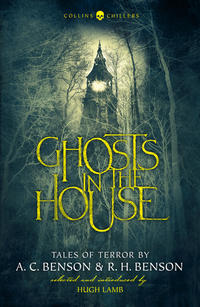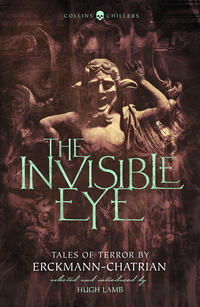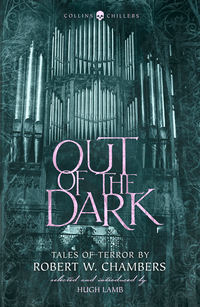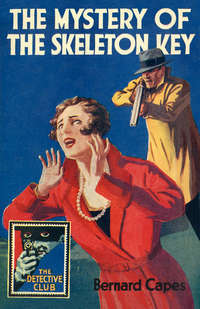
Полная версия
Out of the Dark: Tales of Terror by Robert W. Chambers
As for the sermon, I could not hear a word of it, for the jingle in my ears of
‘The skirts of St Paul has reached.
Having preached us those six Lent lectures,
More unctuous than ever he preached:’
keeping time to the most fantastic and irreverent thoughts.
It was no use to sit there any longer: I must get out of doors and shake myself free from this hateful mood. I knew the rudeness I was committing but still I rose and left the church.
A spring sun was shining on the rue St Honoré, as I ran down the church steps. On one corner stood a barrow full of yellow jonquils, pale violets from the Riviera, dark Russian violets, and white Roman hyacinths in a golden cloud of mimosa. The street was full of Sunday pleasure-seekers. I swung my cane and laughed with the rest. Some one overtook and passed me. He never turned, but there was the same deadly malignity in his white profile that there had been in his eyes. I watched him as long as I could see him. His lithe back expressed the same menace; every step that carried him away from me seemed to bear him on some errand connected with my destruction.
I was creeping along, my feet almost refusing to move. There began to dawn in me a sense of responsibility for something long forgotten. It began to seem as if I deserved that which he threatened: it reached a long way back – a long, long way back. It had lain dormant all these years: it was there though, and presently it would rise and confront me. But I would try to escape; and I stumbled as best I could into the rue de Rivoli, across the Place de la Concorde and on to the Quai. I looked with sick eyes upon the sun, shining through the white foam of the fountain, pouring over the backs of the dusky bronze river-gods, on the far-away Arc, a structure of amethyst mist, on the countless vistas of gray stems and bare branches faintly green. Then I saw him again coming down one of the chestnut alleys of the Cours la Reine.
I left the river side, plunged blindly across to the Champs Elysées and turned toward the Arc. The setting sun was sending its rays along the green sward of the Rond-point: in the full glow he sat on a bench, children and young mothers all about him. He was nothing but a Sunday lounger, like the others, like myself. I said the words almost aloud, and all the while I gazed on the malignant hatred of his face. But he was not looking at me. I crept past and dragged my leaden feet up the Avenue. I knew that every time I met him brought him nearer to the accomplishment of his purpose and my fate. And still I tried to save myself.
The last rays of sunset were pouring through the great Arc. I passed under it, and met him face to face. I had left him far down the Champs Elysées, and yet he came in with a stream of people who were returning from the Bois de Boulogne. He came so close that he brushed me. His slender frame felt like iron inside its loose black covering. He showed no signs of haste, nor of fatigue, nor of any human feeling. His whole being expressed but one thing: the will, and the power to work me evil.
In anguish I watched him, where he went down the broad crowded Avenue, that was all flashing with wheels and the trappings of horses, and the helmets of the Garde Republicaine.
He was soon lost to sight; then I turned and fled. Into the Bois, and far out beyond it – I know not where I went, but after a long while as it seemed to me, night had fallen, and I found myself sitting at a table before a small café. I had wandered back into the Bois. It was hours now since I had seen him. Physical fatigue, and mental suffering had left me no more power to think or feel. I was tired, so tired! I longed to hide away in my own den. I resolved to go home. But that was a long way off.
I live in the Court of the Dragon, a narrow passage that leads from the rue de Rennes to the rue du Dragon.
It is an ‘Impasse’, traversable only for foot passengers. Over the entrance on the rue de Rennes is a balcony, supported by an iron dragon. Within the court tall old houses rise on either side, and close the ends that give on the two streets. Huge gates, swung back during the day into the walls of the deep archways, close this court, after midnight, and one must enter then by ringing at certain small doors on the side. The sunken pavement collects unsavory pools. Steep stairways pitch down to doors that open on the court. The ground floors are occupied by shops of second-hand dealers, and by iron workers. All day long the place rings with the clink of hammers, and the clang of metal bars.
Unsavory as it is below, there is cheerfulness, and comfort, and hard, honest work above.
Five flights up are the ateliers of architects and painters, and the hiding-places of middle-aged students like myself who want to live alone. When I first came here to live I was young, and not alone.
I had to walk awhile before any conveyance appeared, but at last, when I had almost reached the Arc de Triomphe again, an empty cab came along and I took it.
From the Arc to the rue de Rennes is a drive of more than half an hour, especially when one is conveyed by a tired cab horse that has been at the mercy of Sunday fête makers.
There had been time before I passed under the Dragon’s wings, to meet my enemy over and over again, but I never saw him once, now refuge was close at hand.
Before the wide gateway a small mob of children were playing. Our concierge and his wife walked about among them with their black poodle, keeping order; some couples were waltzing on the side-walk. I returned their greetings and hurried in.
All the inhabitants of the court had trooped out into the street. The place was quite deserted, lighted by a few lanterns hung high up, in which the gas burned dimly.
My apartment was at the top of a house, half way down the court, reached by a staircase that descended almost into the street, with only a bit of passage-way intervening. I set my foot on the threshold of the open door, the friendly, old ruinous stairs rose before me, leading up to rest and shelter. Looking back over my right shoulder, I saw him, ten paces off. He must have entered the court with me.
He was coming straight on, neither slowly, nor swiftly, but straight on to me. And now he was looking at me. For the first time since our eyes encountered across the church they met now again, and I knew that the time had come.
Retreating backward, down the court, I faced him. I meant to escape by the entrance on the rue du Dragon. His eyes told me that I never should escape.
It seemed ages while we were going, I retreating, he advancing, down the court in perfect silence; but at last I felt the shadow of the archway, and the next step brought me within it. I had meant to turn here and spring through into the street. But the shadow was not that of an archway; it was that of a vault. The great doors on the rue du Dragon were closed. I felt this by the blackness which surrounded me, and at the same instant I read it in his face. How his face gleamed in the darkness, drawing swiftly nearer! The deep vaults, the huge closed doors, their cold iron clamps were all on his side. The thing which he had threatened had arrived: it gathered and bore down on me from the fathomless shadows; the point from which it would strike was his infernal eyes. Hopeless, I set my back against the barred doors and defied him.
There was a scraping of chairs on the stone floor, and a rustling as the congregation rose. I could hear the Suisse’s staff in the south aisle, preceding Monseigneur C— to the sacristy.
The kneeling nuns, roused from their devout abstraction, made their reverence and went away. The fashionable lady, my neighbor, rose also, with graceful reserve. As she departed her glance just flitted over my face in disapproval.
Half dead, or so it seemed to me, yet intensely alive to every trifle, I sat among the leisurely moving crowd, then rose too and went toward the door.
I had slept through the sermon. Had I slept through the sermon? I looked up and saw him passing along the gallery to his place. Only his side I saw; the thin bent arm in its black covering looked like one of those devilish, nameless instruments which lie in the disused torture chambers of mediaeval castles.
But I had escaped him, though his eyes had said I should not. Had I escaped? That which gave him the power over me came back out of oblivion, where I had hoped to keep it. For I knew him now. Death and the awful abode of lost souls, whither my weakness long ago had sent him – they had changed him for every other eye, but not for mine. I had recognized him almost from the first; I had never doubted what he was come to do; and now I knew that while my body sat safe in the cheerful little church, he had been hunting my soul in the Court of the Dragon.
I crept to the door; the organ broke out overhead with a blare. A dazzling light filled the church, blotting the altar from my eyes. The people faded away, the arches, the vaulted roof vanished. I raised my seared eyes to the fathomless glare, and I saw the black stars hanging in the heavens; and the wet winds from the Lake of Hali chilled my face.
And now, far away, over leagues of tossing cloud-waves, I saw the moon dripping with spray; and beyond, the towers of Carcosa rose behind the moon.
Death and the awful abode of lost souls, whither my weakness long ago had sent him, had changed him for every other eye but mine. And now I heard his voice, rising, swelling, thundering through the flaring light, and as I fell, the radiance increasing, increasing, poured over me in waves of flame. Then I sank into the depths, and I heard the King in Yellow whispering to my soul: ‘It is a fearful thing to fall into the hands of the living God!’
THE MAKER OF MOONS
‘I have heard what the Talkers were talking – the talk
Of the beginning and the end;
But I do not talk of the beginning or the end.’
I
Concerning Yue-Laou and the Xin I know nothing more than you shall know. I am miserably anxious to clear the matter up. Perhaps what I write may save the United States Government money and lives, perhaps it may arouse the scientific world to action; at any rate it will put an end to the terrible suspense of two people. Certainty is better than suspense.
If the Government dares to disregard this warning and refuses to send a thoroughly equipped expedition at once, the people of the State may take swift vengeance on the whole region and leave a blackened devastated waste where today forest and flowering meadowland border the lake in the Cardinal Woods.
You already know part of the story; the New York papers have been full of alleged details. This much is true: Barris caught the ‘Shiner’ red-handed, or rather yellow-handed, for his pockets and boots and dirty fists were stuffed with lumps of gold. I say gold, advisedly. You may call it what you please. You also know how Barris was – but unless I begin at the beginning of my own experiences you will be none the wiser after all.
On the third of August of this present year I was standing in Tiffany’s, chatting with George Godfrey of the designing department. On the glass counter between us lay a coiled serpent, an exquisite specimen of chiseled gold.
‘No,’ replied Godfrey to my question, ‘it isn’t my work; I wish it was. Why, man, it’s a masterpiece!’
‘Whose?’ I asked.
‘Now I should be very glad to know also,’ said Godfrey. ‘We bought it from an old jay who says he lives in the country somewhere about the Cardinal Woods. That’s near Starlit Lake, I believe—’
‘Lake of the Stars?’ I suggested.
‘Some call it Starlit Lake – it’s all the same. Well, my rustic Reuben says that he represents the sculptor of this snake for all practical and business purposes. He got his price too. We hope he’ll bring us something more. We have sold this already to the Metropolitan Museum.’
I was leaning idly on the glass case, watching the keen eyes of the artist in precious metals as he stooped over the gold serpent.
‘A masterpiece!’ he muttered to himself, fondling the glittering coil, ‘look at the texture! whew!’ But I was not looking at the serpent. Something was moving – crawling out of Godfrey’s coat pocket – the pocket nearest me – something soft and yellow with crablike legs all covered with coarse yellow hair.
‘What in Heaven’s name,’ said I, ‘have you got in your pocket? It’s crawling out – it’s trying to creep up your coat, Godfrey!’
He turned quickly and dragged the creature out with his left hand.
I shrank back as he held the repulsive object dangling before me, and he laughed and placed it on the counter.
‘Did you ever see anything like that?’ he demanded.
‘No,’ said I truthfully, ‘and I hope I never shall again. What is it?’
‘I don’t know. Ask them at the Natural History Museum – they can’t tell you. The Smithsonian is all at sea too. It is, I believe, the connecting link between a sea urchin, a spider, and the devil. It looks venomous but I can’t find either fangs or mouth. Is it blind? These things may be eyes but they looks as if they were painted. A Japanese sculptor might have produced such an impossible beast, but it is hard to believe that God did. It looks unfinished too. I have a mad idea that this creature is only one of the parts of some larger and more grotesque organism – it looks so lonely, so hopelessly dependent, so cursedly unfinished. I’m going to use it as a model. If I don’t out-Japanese the Japs my name isn’t Godfrey.’
The creature was moving slowly across the glass case towards me. I drew back.
‘Godfrey,’ I said, ‘I would execute a man who executed any such work as you propose. What do you want to perpetuate such a reptile for? I can stand the Japanese grotesque but I can’t stand that – spider—’
‘It’s a crab.’
‘Crab or spider or blindworm – ugh! What do you want to do it for? It’s a nightmare – it’s unclean!’
I hated the thing. It was the first living creature that I had ever hated.
For some time I had noticed a damp acrid odor in the air, and Godfrey said it came from the reptile.
‘Then kill it and bury it,’ I said, ‘and by the way, where did it come from?’
‘I don’t know that either,’ laughed Godfrey. ‘I found it clinging to the box that this gold serpent was brought in. I suppose my old Reuben is responsible.’
‘If the Cardinal Woods are the lurking places for things like this,’ said I, ‘I am sorry that I am going to the Cardinal Woods.’
‘Are you?’ asked Godfrey; ‘for the shooting?’
‘Yes, with Barris and Pierpont. Why don’t you kill that creature?’
‘Go off on your shooting trip, and let me alone,’ laughed Godfrey.
I shuddered at the ‘crab’, and bade Godfrey good-bye until December.
That night, Pierpont, Barris, and I sat chatting in the smoking car of the Quebec Express when the long train pulled out of the Grand Central Depot. Old David had gone forward with the dogs; poor things, they hated to ride in the baggage car, but the Quebec and Northern road provides no sportsman’s cars, and David and the three Gordon setters were in for an uncomfortable night.
Except for Pierpont, Barris, and myself, the car was empty. Barris, trim, stout, ruddy, and bronzed, sat drumming on the window ledge, puffing a short fragrant pipe. His gun case lay beside him on the floor.
‘When I have white hair and years of discretion,’ said Pierpont languidly, ‘I’ll not flirt with pretty serving maids; will you, Roy?’
‘No,’ said I, looking at Barris.
‘You mean the maid with the cap in the Pullman car?’ asked Barris.
‘Yes,’ said Pierpont.
I smiled, for I had seen it also.
Barris twisted his crisp gray moustache, and yawned.
‘You children had better be toddling off to bed,’ he said. ‘That lady’s-maid is a member of the Secret Service.’
‘Oh,’ said Pierpont, ‘one of your colleagues?’
‘You might present us, you know,’ I said; ‘the journey is monotonous.’
Barris had drawn a telegram from his pocket, and as he sat turning it over and over between his fingers he smiled. After a moment or two he handed it to Pierpont who read it with slightly raised eyebrows.
‘It’s rot – I suppose it’s cipher,’ he said. ‘I see it’s signed by General Drummond—’
‘Drummond, Chief of the Government Secret Service,’ said Barris.
‘Something interesting?’ I enquired, lighting a cigarette.
‘Something so interesting,’ replied Barris, ‘that I’m going to look into it myself—’
‘And break up our shooting trio—’
‘No. Do you want to hear about it? Do you, Billy Pierpont?’
‘Yes,’ replied that immaculate young man.
Barris rubbed the amber mouthpiece of his pipe on his handkerchief, cleared the stem with a bit of wire, puffed once or twice, and leaned back in his chair.
‘Pierpont,’ he said, ‘do you remember that evening at the United States Club when General Miles, General Drummond, and I were examining that gold nugget that Captain Mahan had? You examined it also, I believe.’
‘I did,’ said Pierpont.
‘Was it gold?’ asked Barris, drumming on the window.
‘It was,’ replied Pierpont.
‘I saw it too,’ said I; ‘of course, it was gold.’
‘Professor La Grange saw it also,’ said Barris; ‘he said it was gold.’
‘Well?’ said Pierpont.
‘Well,’ said Barris, ‘it was not gold.’
After a silence Pierpont asked what tests had been made.
‘The usual tests,’ replied Barris. ‘The United States Mint is satisfied that it is gold, so is every jeweller who has seen it. But it is not gold – and yet – it is gold.’
Pierpont and I exchanged glances.
‘Now,’ said I, ‘for Barris’ usual coup-de-théâtre: what was the nugget?’
‘Practically it was pure gold; but,’ said Barris, enjoying the situation intensely, ‘really it was not gold. Pierpont, what is gold?’
‘Gold’s an element, a metal—’
‘Wrong! Billy Pierpont,’ said Barris coolly.
‘Gold was an element when I went to school,’ said I.
‘It has not been an element for two weeks,’ said Barris; ‘and, except General Drummond, Professor La Grange, and myself, you two youngsters are the only people, except one, in the world who know it – or have known it.’
‘Do you mean to say that gold is a composite metal?’ said Pierpont slowly.
‘I do. La Grange has made it. He produced a scale of pure gold day before yesterday. That nugget was manufactured gold.’
Could Barris be joking? Was this a colossal hoax? I looked at Pierpont. He muttered something about that settling the silver question, and turned his head to Barris, but there was that in Barris’ face which forbade jesting, and Pierpont and I sat silently pondering.
‘Don’t ask me how it’s made,’ said Barris, quietly; ‘I don’t know. But I do know that somewhere in the region of the Cardinal Woods there is a gang of people who do know how gold is made, and who make it. You understand the danger this is to every civilized nation. It’s got to be stopped of course. Drummond and I have decided that I am the man to stop it. Wherever and whoever these people are – these gold makers – they must be caught, every one of them – caught or shot.’
‘Or shot,’ repeated Pierpont, who was owner of the Cross-Cut Gold Mine and found his income too small; ‘Professor La Grange will of course be prudent – science need not know things that would upset the world!’
‘Little Willy,’ said Barris laughing, ‘your income is safe.’
‘I suppose,’ said I, ‘some flaw in the nugget gave Professor La Grange the tip.’
‘Exactly. He cut the flaw out before sending the nugget to be tested. He worked on the flaw and separated gold into its three elements.’
‘He is a great man,’ said Pierpont, ‘but he will be the greatest man in the world if he can keep his discovery to himself.’
‘Who?’ said Barris.
‘Professor La Grange.’
‘Professor La Grange was shot through the heart two hours ago,’ replied Barris slowly.
II
We had been at the shooting box in the Cardinal Woods five days when a telegram was brought to Barris by a mounted messenger from the nearest telegraph station, Cardinal Springs, a hamlet on the lumber railroad which joins the Quebec and Northern at Three Rivers Junction, thirty miles below.
Pierpont and I were sitting out under the trees, loading some special shells as experiments; Barris stood beside us, bronzed, erect, holding his pipe carefully so that no sparks should drift into our powder box. The beat of hoofs over the grass aroused us, and when the lank messenger drew bridle before the door, Barris stepped forward and took the sealed telegram. When he had torn it open he went into the house and presently reappeared, reading something that he had written.
‘This should go at once,’ he said, looking the messenger full in the face.
‘At once, Colonel Barris,’ replied the shabby countryman.
Pierpont glanced up and I smiled at the messenger who was gathering his bridle and settling himself in his stirrups. Barris handed him the written reply and nodded good-bye: there was a thud of hoofs on the greensward, a jingle of bit and spur across the gravel, and the messenger was gone. Barris’ pipe went out and he stepped to windward to relight it.
‘It is queer,’ said I, ‘that your messenger – a battered native – should speak like a Harvard man.’
‘He is a Harvard man,’ said Barris.
‘And the plot thickens,’ said Pierpont; ‘are the Cardinal Woods full of your Secret Service men, Barris?’
‘No,’ replied Barris, ‘but the telegraph stations are. How many ounces of shot are you using, Roy?’
I told him, holding up the adjustable steel measuring cup. He nodded. After a moment or two he sat down on a camp stool beside us and picked up a crimper.
‘That telegram was from Drummond,’ he said; ‘the messenger was one of my men as you two bright little boys divined. Pooh! If he had spoken the Cardinal County dialect you wouldn’t have known.’
‘His make-up was good,’ said Pierpont.
Barris twirled the crimper and looked at the pile of loaded shells. Then he picked up one and crimped it.
‘Let ’em alone,’ said Pierpont, ‘you crimp too tight.’
‘Does his little gun kick when the shells are crimped too tight?’ enquired Barris tenderly; ‘well, he shall crimp his own shells then – where’s his little man?’
‘His little man,’ was a weird English importation, stiff, very carefully scrubbed, tangled in his aspirates, named Howlett. As valet, gilly, gunbearer, and crimper, he aided Pierpont to endure the ennui of existence, by doing for him everything except breathing. Lately, however, Barris’ taunts had driven Pierpont to do a few things for himself. To his astonishment he found that cleaning his own gun was not a bore, so he timidly loaded a shell or two, was much pleased with himself, loaded some more, crimped them, and went to breakfast with an appetite. So when Barris asked where ‘his little man’ was, Pierpont did not reply but dug a cupful of shot from the bag and poured it solemnly into the half filled shell.
Old David came out with the dogs and of course there was a powwow when Voyou, my Gordon, wagged his splendid tail across the loading table and sent a dozen unstopped cartridges rolling over the grass, vomiting powder and shot.
‘Give the dogs a mile or two,’ said I; ‘we will shoot over the Sweet Fern Covert about four o’clock, David.’
‘Two guns, David,’ added Barris.
‘Are you not going?’ asked Pierpont, looking up, as David disappeared with the dogs.
‘Bigger game,’ said Barris shortly. He picked up a mug of ale from the tray which Howlett had just set down beside us and took a long pull. We did the same, silently. Pierpont set his mug on the turf beside him and returned to his loading.







